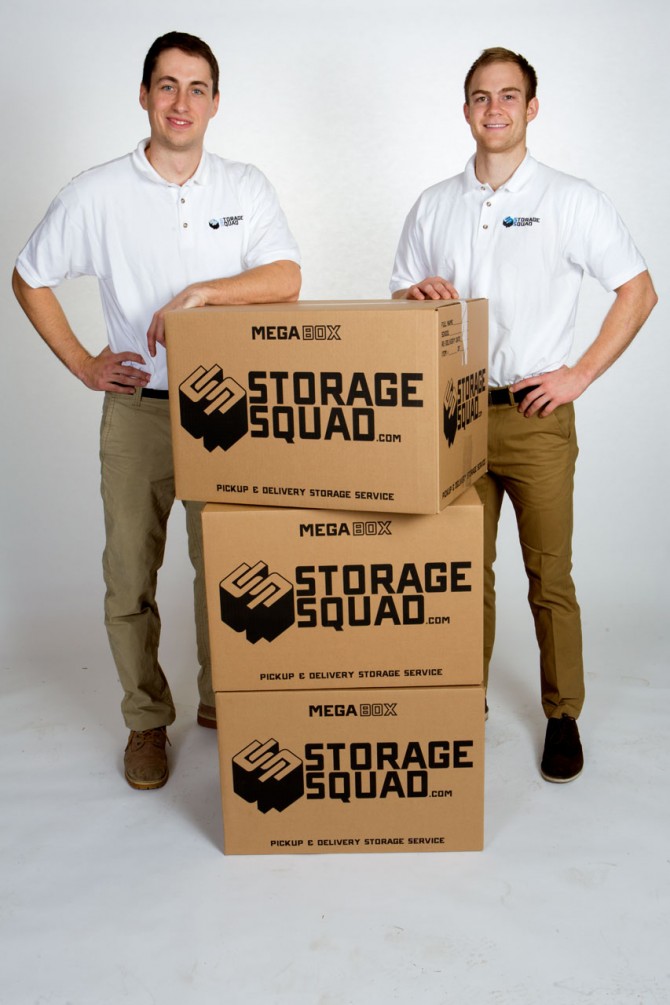ILR alumni sell storage business for seven figures
By Casey Verderosa
When Nick Huber ’12 and Dan Hagberg ’12 started a storage business out of their Collegetown basement, they didn’t realize it would change their lives.
“At the end of our junior year, during finals week on a whim, Dan and I started driving around, picking up and storing people’s stuff,” Huber said. They used their first profit to pay their rent.
By the time of their exit from Storage Squad in January 2021 – sold to the tune of seven figures to a company in the storage container space – the startup was operating on 30 college campuses in 15 cities across nine states.
Huber and Hagberg were not business students; they’re alumni of the ILR School, but thanks to an effort by Cornell to weave entrepreneurship opportunities across disciplines, the team worked on its venture during several introductory and advanced entrepreneurship ILR and SC Johnson College of Business courses.
“Entrepreneurship gets a reputation that it’s only something that business or programming guys can do,” Hagberg said, “but anybody can be an entrepreneur – you just have to have the right mindset.”
The student entrepreneurs were mentored by Daniel Cohen, who at the time was a Cornell faculty member and the founding director of eLab, Cornell’s student accelerator; and Zachary Shulman, the director of Entrepreneurship at Cornell.
Hagberg and Huber still check in with their mentors today.
“If we have a problem, we hop on the phone and they help us solve it,” Huber said.
When the pair started Storage Squad, they were not only full-time college students, but co-captains of Cornell men’s track and field team. They each won individual Ivy League championships, and Huber was a two-time NCAA All-American, while both earned a Division I All-Academic Track Field and Team selection. Juggling their responsibilities was a balancing act, they said.
Huber remembers taking customer service calls during Ivy League championship track meets. One of the company’s busiest periods of the year, when college students are moving out of town to go home, coincided with their own finals week. The pair also cut many leisure activities out of their lives for a time. “There were no video games, no binge-watching Game of Thrones,” Hagberg said. “There was no time for that.”
Hagberg and Huber want other budding Cornell entrepreneurs to know that it’s possible to build a business without inventing a new, high-tech product.
“You can start a small business that isn’t really revolutionary or new and operate it well and be successful,” Huber said. “Me and Dan are living proof of that. We started a small business in Ithaca and it completely changed our lives.”
The pair are big proponents of starting a business in college. “It’s easier to transition from broke college student to broke entrepreneur,” Hagberg said. “It’s a lot harder to go from having a steady paying job, maybe getting married, having a kid, to being a broke entrepreneur. College is an OK time to fail.”
But fail they did not. Storage Squad has maintained its presence on Cornell’s campus since 2011. When the COVID-19 pandemic hit and the university needed to move students off campus quickly in March 2020, the company marshaled its resources. They hired a team of 30 people to drive about 40,000 boxes in, dole them out to more than 2,000 students, and store everything in their warehouse.
“We’re so grateful to Nick and Dan and the Storage Squad team for jumping in to assist Campus Life and our students with no advance notice last spring,” said Karen Brown, senior director of Campus Life Marketing and Communications. “We were able to partner with them to help our students relocate quickly and safely, and I can’t imagine a better experience or better partners. It was easy to tell that they bring genuine compassion to their work with each customer, big and small.”
Now the duo is working on a new venture, Bolt Storage – a self-storage company with an enhanced, technology-driven customer service experience. The founders have purchased a total of 12 self-storage facilities since 2017 with 10 more under contract set to close this summer.
“When we acquire a new asset, we wrap the facility in tech and turn it into a better and more user-friendly customer experience,” Huber said.
Customers can do almost everything virtually: find units, sign leases, pay their bills. Especially relevant in the COVID-19 era, they can enter the facility without coming into contact with anyone, since on-site customer interfaces are technology-driven as well.
Although moving on to a second venture has made Huber and Hagberg more seasoned business owners, they still draw from their Cornell entrepreneurship lessons.
“Cornell changed the way I think about business,” Huber said. “I learned how to solve problems and be resourceful there. College is about more than just the learning, though – it’s the community, it’s the network. Our network is phenomenally valuable in everything we do.”
Casey Verderosa is a writer for the Center for Regional Economic Advancement.
Media Contact
Get Cornell news delivered right to your inbox.
Subscribe

